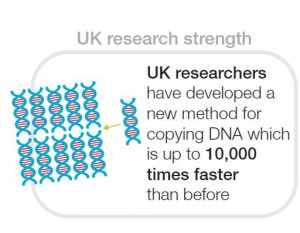6th November 2015 San Francisco, USA
BLOG: The Next Biological Frontier- SynBio
Uncovering DNA as the building block for life was a long journey, which flourished with the discovery of the double helix by the English-American team of Francis Crick and James Watson (based on the work of Rosalind Franklin and Maurice Wilkins). Since then, scientists and researchers have been exploring DNA’s role in the development of function and reproduction of all living things, and the late half of the 20th century ushered in the modern era of biology.
With understanding came the ability to create DNA through DNA synthesis, which in turn, is helping the development of synthetic biology. Synthetic biology is the convergence of many scientific fields, including chemistry, computer science, engineering and biology to create new biological systems. Advances in this field have generated benefit for a plethora of industries, including agriculture, medicine, materials and engineering, amongst others.

The UK has set synthetic biology as a priority since 2007, and it was named one of the Eight Great Technologies in 2012. In that announcement, it was highlighted that the UK would be investing over £600 million in the Eight Great Technologies to explore world leading research and commercialisation opportunities; £50 million of this was ear-marked for support of Synthetic Biology through the Research Councils Synthetic Biology for Growth (SBfG) Programme. Since then, the UK, through the Research Councils, Innovate UK and other government agencies, has made significant progress in this space. This has included the implementation of the £102 million SBfG Programme and the establishment of the SynBiCITE Innovation and Knowledge Centre (IKC). Through two rounds of strategic investment, £18 million of the SBfG Programme was invested in six academic-based DNA Synthesis Centres, with the aim of establishing a UK capability in DNA synthesis.
As part of the UK’s global engagement in this sector, the UK SIN in the US has held a number of activities around DNA Synthesis and Synthetic Biology to promote UK-US collaborations in this space. Most recently, representatives from several of the UK based DNA Synthesis centres travelled to Boston, MA and San Francisco, CA in the summer of 2014 to learn about projects and advancements being made in the US. As a result of that engagement, the UK Science and Innovation Network (UK SIN) partnered with the Biotechnology and Biological Science Research Council (BBSRC) again to host a return trip to the UK this past summer.
Four delegates from the US joined several UK colleagues at the first annual Synthetic Biology UK 2015 Conference from 1-3 September. At the conclusion of the Conference, UK and US colleagues had an opportunity to discuss their DNA Synthesis work, common issues within the practice of DNA synthesis and synthetic biology, while building long-term collaborations and partnerships. These teams are now exploring potential international collaborative projects that will help advance the field for both countries.
For more information about the BBSRC’s role in the UK’s synthetic biology strategy, including the Synthetic Biology Roadmap, please visit their website. Additional examples of the UK’s work in this field, including impacts and outcomes to date, can be found on the Global Biotech Revolution’s blog page.